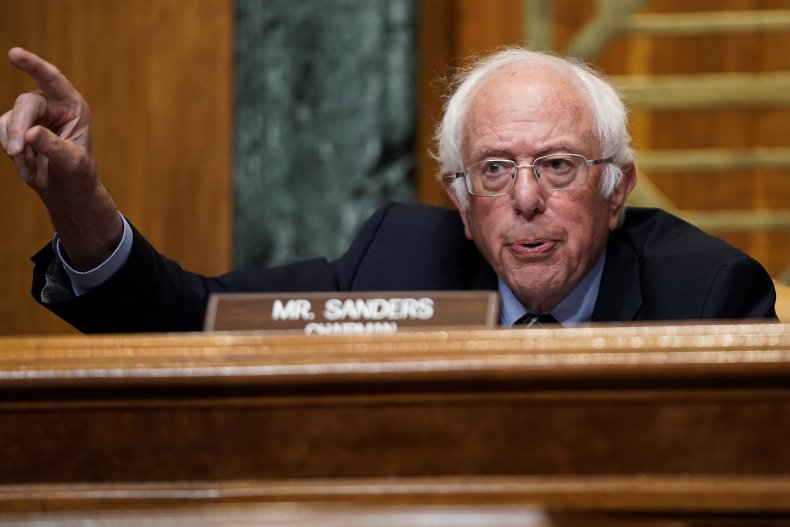JACK DUTTON
Vermont Senator Bernie Sanders (I-VT) has called for increased cooperation between the United States and China to avoid "a new Cold War."
Tensions between the two countries have risen in recent years, with a bitter trade dispute and former President Donald Trump blaming China for not doing more to suppress the coronavirus outbreak at the end of 2019.
In a communique on Sunday, U.S. President Joe Biden and other G7 leaders accused China of engaging in human rights abuses. China also led the agenda at the subsequent NATO summit and Beijing was called out in the alliance's closing statement.
But in an opinion piece for Foreign Affairs published on Thursday, Sanders called for cooperation between the world's two major superpowers.
"The unprecedented global challenges that the United States faces today—climate change, pandemics, nuclear proliferation, massive economic inequality, terrorism, corruption, authoritarianism—are shared global challenges. They cannot be solved by any one country acting alone. They require increased international cooperation—including with China, the most populous country on earth," the senator wrote.
Although he noted that Beijing had become increasingly aggressive on the international stage, Sanders called it "distressing and dangerous" that there was a growing consensus in Washington D.C. to view its relationship with Beijing in terms of economic and military competition.
He referred to a trade deal in September 2000, when America granted China "permanent normal trade relations status." He went on to say that, at the time, many economists believed that the accord would make U.S. companies more competitive, by giving them access to China's growing market. And many economists expected China to liberalize and become more of a democracy and address its human rights abuses.
Sanders wrote that he criticized this deal at the time, saying that allowing American companies to move to China and hire workers there at paltry wages would spur "a race to the bottom" resulting in job losses in America and lower domestic wages.
"In the roughly two decades that followed, around two million American jobs were lost, more than 40,000 factories shut down, and American workers experienced wage stagnation—even while corporations made billions and executives were richly rewarded," Sanders said, noting that Trump won the 2016 election partially by tapping into the economic struggles of voters, by campaigning against U.S. trade policies.
Sanders said all Americans should condemn the theft of technology, the suppression of workers' rights and the press, China's move to exert influence over Tibet, Hong Kong and Taiwan. The senator also condemned the Chinese government's treatment of the Uyghur Muslims, calling its policies "atrocious."
"Organizing our foreign policy around a zero-sum global confrontation with China, however, will fail to produce better Chinese behavior and be politically dangerous and strategically counterproductive," he wrote.
Sanders said the "fearmongering" around China evoked memories of the America's "war on terror" in the wake of the 9/11 attacks, which saw billions of dollars spent on U.S. military capability to launch "endless wars" that proved too costly in human, economic and strategic terms — and that Arab communities bore the brunt of this.
He added with the rising animosity towards China, it was no surprise that America was seeing more anti-Asian hate crimes.
Although he acknowledged the U.S. was more divided that it has been in recent years, Sanders urged Americans to "resist the temptation to try to forge national unity through hostility and fear."
"The administration of U.S. President Joe Biden has rightly recognized the rise of authoritarianism as a major threat to democracy. The primary conflict between democracy and authoritarianism, however, is taking place not between countries but within them—including in the United States."
If democracy was going to prevail, Sanders said, it will not on a battlefield but instead would be in proving that democracy provides a better quality of life for people than authoritarianism can.
Sanders called on the Biden administration to "revitalize" democracy by addressing the long-forgotten needs of American families, which would make the U.S. "more competitive with China." The senator said this could be done by creating millions of well-paid jobs to rebuild infrastructure and combat climate change.
 Bernie Sanders gives an opening statement during a Senate Budget Committee hearing on June 8, 2021 in Washington, D.C. The Vermont senator has called for increased U.S. cooperation with China despite growing sentiment on Capitol Hill that Beijing is becoming a threat.GREG NASH-POOL/GETTY
Bernie Sanders gives an opening statement during a Senate Budget Committee hearing on June 8, 2021 in Washington, D.C. The Vermont senator has called for increased U.S. cooperation with China despite growing sentiment on Capitol Hill that Beijing is becoming a threat.GREG NASH-POOL/GETTYHe applauded the Biden's administration's push for a global minimum corporate tax but said it could go a step further pushing for a global minimum wage.
"Creating true security and prosperity for working people in the United States and China alike demands building a more equitable global system that prioritizes human needs over corporate greed and militarism. In the United States, handing billions more in taxpayer dollars to corporations and the Pentagon while inflaming bigotry will not serve these goals," Sanders said.
He warned that Americans shouldn't be naive about China's intentions, but also voiced his support for international cooperation, including with Beijing.
"I fear, however, that the growing bipartisan push for a confrontation with China will set back those goals and risks empowering authoritarian, ultranationalistic forces in both countries," Sanders wrote. "It will also deflect attention from the shared common interests the two countries have in combating truly existential threats such as climate change, pandemics, and the destruction that a nuclear war would bring.
"Developing a mutually beneficial relationship with China will not be easy. But we can do better than a new Cold War."
No comments:
Post a Comment